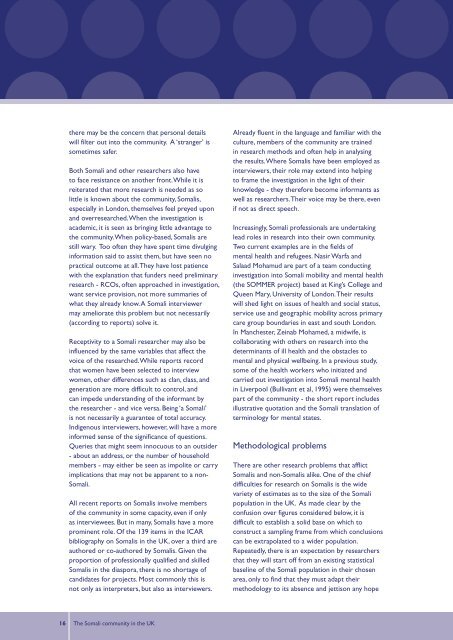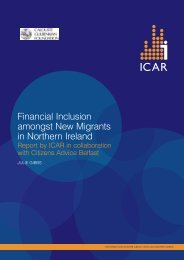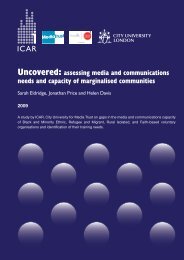The Somali community in the UK: What we know and how we ... - ICAR
The Somali community in the UK: What we know and how we ... - ICAR
The Somali community in the UK: What we know and how we ... - ICAR
You also want an ePaper? Increase the reach of your titles
YUMPU automatically turns print PDFs into web optimized ePapers that Google loves.
<strong>the</strong>re may be <strong>the</strong> concern that personal details<br />
will filter out <strong>in</strong>to <strong>the</strong> <strong>community</strong>. A ‘stranger’ is<br />
sometimes safer.<br />
Both <strong>Somali</strong> <strong>and</strong> o<strong>the</strong>r researchers also have<br />
to face resistance on ano<strong>the</strong>r front. While it is<br />
reiterated that more research is needed as so<br />
little is <strong>know</strong>n about <strong>the</strong> <strong>community</strong>, <strong>Somali</strong>s,<br />
especially <strong>in</strong> London, <strong>the</strong>mselves feel preyed upon<br />
<strong>and</strong> overresearched. When <strong>the</strong> <strong>in</strong>vestigation is<br />
academic, it is seen as br<strong>in</strong>g<strong>in</strong>g little advantage to<br />
<strong>the</strong> <strong>community</strong>. When policy-based, <strong>Somali</strong>s are<br />
still wary. Too often <strong>the</strong>y have spent time divulg<strong>in</strong>g<br />
<strong>in</strong>formation said to assist <strong>the</strong>m, but have seen no<br />
practical outcome at all. <strong>The</strong>y have lost patience<br />
with <strong>the</strong> explanation that funders need prelim<strong>in</strong>ary<br />
research - RCOs, often approached <strong>in</strong> <strong>in</strong>vestigation,<br />
want service provision, not more summaries of<br />
what <strong>the</strong>y already <strong>know</strong>. A <strong>Somali</strong> <strong>in</strong>tervie<strong>we</strong>r<br />
may ameliorate this problem but not necessarily<br />
(accord<strong>in</strong>g to reports) solve it.<br />
Receptivity to a <strong>Somali</strong> researcher may also be<br />
<strong>in</strong>fluenced by <strong>the</strong> same variables that affect <strong>the</strong><br />
voice of <strong>the</strong> researched. While reports record<br />
that women have been selected to <strong>in</strong>terview<br />
women, o<strong>the</strong>r differences such as clan, class, <strong>and</strong><br />
generation are more difficult to control, <strong>and</strong><br />
can impede underst<strong>and</strong><strong>in</strong>g of <strong>the</strong> <strong>in</strong>formant by<br />
<strong>the</strong> researcher - <strong>and</strong> vice versa. Be<strong>in</strong>g ‘a <strong>Somali</strong>’<br />
is not necessarily a guarantee of total accuracy.<br />
Indigenous <strong>in</strong>tervie<strong>we</strong>rs, ho<strong>we</strong>ver, will have a more<br />
<strong>in</strong>formed sense of <strong>the</strong> significance of questions.<br />
Queries that might seem <strong>in</strong>nocuous to an outsider<br />
- about an address, or <strong>the</strong> number of household<br />
members - may ei<strong>the</strong>r be seen as impolite or carry<br />
implications that may not be apparent to a non-<br />
<strong>Somali</strong>.<br />
All recent reports on <strong>Somali</strong>s <strong>in</strong>volve members<br />
of <strong>the</strong> <strong>community</strong> <strong>in</strong> some capacity, even if only<br />
as <strong>in</strong>tervie<strong>we</strong>es. But <strong>in</strong> many, <strong>Somali</strong>s have a more<br />
prom<strong>in</strong>ent role. Of <strong>the</strong> 139 items <strong>in</strong> <strong>the</strong> <strong>ICAR</strong><br />
bibliography on <strong>Somali</strong>s <strong>in</strong> <strong>the</strong> <strong>UK</strong>, over a third are<br />
authored or co-authored by <strong>Somali</strong>s. Given <strong>the</strong><br />
proportion of professionally qualified <strong>and</strong> skilled<br />
<strong>Somali</strong>s <strong>in</strong> <strong>the</strong> diaspora, <strong>the</strong>re is no shortage of<br />
c<strong>and</strong>idates for projects. Most commonly this is<br />
not only as <strong>in</strong>terpreters, but also as <strong>in</strong>tervie<strong>we</strong>rs.<br />
Already fluent <strong>in</strong> <strong>the</strong> language <strong>and</strong> familiar with <strong>the</strong><br />
culture, members of <strong>the</strong> <strong>community</strong> are tra<strong>in</strong>ed<br />
<strong>in</strong> research methods <strong>and</strong> often help <strong>in</strong> analys<strong>in</strong>g<br />
<strong>the</strong> results. Where <strong>Somali</strong>s have been employed as<br />
<strong>in</strong>tervie<strong>we</strong>rs, <strong>the</strong>ir role may extend <strong>in</strong>to help<strong>in</strong>g<br />
to frame <strong>the</strong> <strong>in</strong>vestigation <strong>in</strong> <strong>the</strong> light of <strong>the</strong>ir<br />
<strong>know</strong>ledge - <strong>the</strong>y <strong>the</strong>refore become <strong>in</strong>formants as<br />
<strong>we</strong>ll as researchers. <strong>The</strong>ir voice may be <strong>the</strong>re, even<br />
if not as direct speech.<br />
Increas<strong>in</strong>gly, <strong>Somali</strong> professionals are undertak<strong>in</strong>g<br />
lead roles <strong>in</strong> research <strong>in</strong>to <strong>the</strong>ir own <strong>community</strong>.<br />
Two current examples are <strong>in</strong> <strong>the</strong> fields of<br />
mental health <strong>and</strong> refugees. Nasir Warfa <strong>and</strong><br />
Salaad Mohamud are part of a team conduct<strong>in</strong>g<br />
<strong>in</strong>vestigation <strong>in</strong>to <strong>Somali</strong> mobility <strong>and</strong> mental health<br />
(<strong>the</strong> SOMMER project) based at K<strong>in</strong>g’s College <strong>and</strong><br />
Queen Mary, University of London. <strong>The</strong>ir results<br />
will shed light on issues of health <strong>and</strong> social status,<br />
service use <strong>and</strong> geographic mobility across primary<br />
care group boundaries <strong>in</strong> east <strong>and</strong> south London.<br />
In Manchester, Ze<strong>in</strong>ab Mohamed, a midwife, is<br />
collaborat<strong>in</strong>g with o<strong>the</strong>rs on research <strong>in</strong>to <strong>the</strong><br />
determ<strong>in</strong>ants of ill health <strong>and</strong> <strong>the</strong> obstacles to<br />
mental <strong>and</strong> physical <strong>we</strong>llbe<strong>in</strong>g. In a previous study,<br />
some of <strong>the</strong> health workers who <strong>in</strong>itiated <strong>and</strong><br />
carried out <strong>in</strong>vestigation <strong>in</strong>to <strong>Somali</strong> mental health<br />
<strong>in</strong> Liverpool (Bullivant et al, 1995) <strong>we</strong>re <strong>the</strong>mselves<br />
part of <strong>the</strong> <strong>community</strong> - <strong>the</strong> short report <strong>in</strong>cludes<br />
illustrative quotation <strong>and</strong> <strong>the</strong> <strong>Somali</strong> translation of<br />
term<strong>in</strong>ology for mental states.<br />
Methodological problems<br />
<strong>The</strong>re are o<strong>the</strong>r research problems that afflict<br />
<strong>Somali</strong>s <strong>and</strong> non-<strong>Somali</strong>s alike. One of <strong>the</strong> chief<br />
difficulties for research on <strong>Somali</strong>s is <strong>the</strong> wide<br />
variety of estimates as to <strong>the</strong> size of <strong>the</strong> <strong>Somali</strong><br />
population <strong>in</strong> <strong>the</strong> <strong>UK</strong>. As made clear by <strong>the</strong><br />
confusion over figures considered below, it is<br />
difficult to establish a solid base on which to<br />
construct a sampl<strong>in</strong>g frame from which conclusions<br />
can be extrapolated to a wider population.<br />
Repeatedly, <strong>the</strong>re is an expectation by researchers<br />
that <strong>the</strong>y will start off from an exist<strong>in</strong>g statistical<br />
basel<strong>in</strong>e of <strong>the</strong> <strong>Somali</strong> population <strong>in</strong> <strong>the</strong>ir chosen<br />
area, only to f<strong>in</strong>d that <strong>the</strong>y must adapt <strong>the</strong>ir<br />
methodology to its absence <strong>and</strong> jettison any hope<br />
16 <strong>The</strong> <strong>Somali</strong> <strong>community</strong> <strong>in</strong> <strong>the</strong> <strong>UK</strong>

















